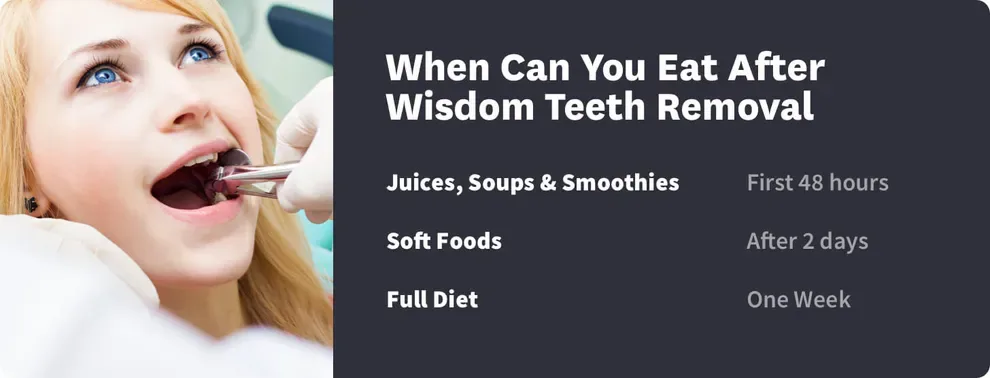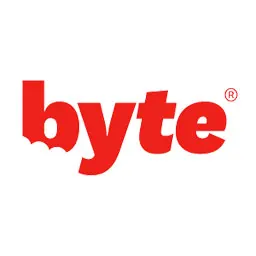How Soon After Wisdom Teeth Removal Am I Able to Eat?

Table of Contents
- Eating after Wisdom Tooth Removal
- Wisdom Tooth Removal Recovery
- What Foods Can I Eat?
- Best Drinks after Wisdom Tooth Removal
- Getting Back to Normal
- Wisdom Teeth Food TImeline
- Wisdom Teeth Removal & Eating FAQs
- References
You can eat a couple hours after wisdom teeth removal, but the food you consume should be in liquid form, like smoothies. You are safe to eat soft foods about 24 to 48 hours after wisdom teeth removal.
Wisdom tooth removal is a common surgery, but it is considered invasive, so healing afterward takes as long as two weeks. In the first 24 to 48 hours, only consume smooth soup and juice. Then, you can begin to add textured soft foods like mashed potatoes, scrambled eggs, and avocados.
After the first week, you may be able to eat most foods you love. It might take another week before you can eat some crunchy or spicy food.
Eating after Wisdom Tooth Removal
As anesthesia wears off after your wisdom tooth removal surgery, you may begin to feel hungry. While you can eat some foods right after your wisdom teeth are removed, these must be very soft, so they do not require any chewing.
Hours after your wisdom teeth are removed, you should stick to broth and juice. The next day, you may add yogurt, smooth soups, pudding, refried beans, mashed potatoes, and other foods that do not require much chewing. After three days, you can eat soft food that might involve some chewing, like scrambled eggs and macaroni and cheese.
Avoid tough or crunchy foods, including popcorn, hamburgers, chips, chicken breast, salads, and similar foods. You should also avoid acidic, spicy, or sugary foods. Do not drink alcohol or smoke during this time.
After about a week, your gums should be healed enough to eat most of your favorite foods, although your gums may still be sensitive, so you might want to avoid crunchy and spicy food.

What Is It Like To Recover from Wisdom Tooth Removal?
Many adults in the United States have their wisdom teeth removed, typically around the time they start to come in. Although some dentists are trying to let their patients’ wisdom teeth come in naturally rather than preemptively removing them, wisdom teeth can often crowd the other teeth, cause too much pressure, and lead to gum disease.
Fortunately, wisdom teeth removal is a standard, common operation that dentists are well trained in.
Recovery from wisdom tooth removal takes about two weeks, on average. For the first week or so after the extraction, you can expect side effects like these:
Swollen mouth and cheeks, which might make it difficult to eat
Some visible bruising on the cheeks
A stiff, sore jaw that should wear off in about 7 to 10 days
Pain, which over-the-counter pain medications should take care of
An unpleasant taste in your mouth
Bad breath, which should go away in a few days
Bleeding that should stop after one to two days
In the first 24 hours after your wisdom teeth are removed, you should replace the gauze in your mouth as directed. Avoid spitting, sipping through straws, rinsing your mouth out, smoking, and drinking alcohol. You may only be able to drink water, broth, and juice.
After the first 24 hours, gently rinse your mouth as directed by your dentist, and stick with the recommended foods. Avoid strenuous exercise for a few days, and prop your head up with an extra pillow at night to reduce swelling. You should be able to return to work after about a week, although your gums will not be completely healed, and you may still experience some discomfort.
Following the early stages of wisdom teeth removal, your mouth is at risk of bacteria. During this time, developing a cavity can undoubtedly occur, which is why taking care of your oral hygiene is so important.
What Foods Can I Eat After Wisdom Tooth Removal & When?
In the first 48 hours after your wisdom teeth are removed, stick to soft foods like these:
Jell-O
Ice cream
Pudding
Soup
Juice
Smoothies
Apple sauce
Cottage cheese
After the first two days, you can add other foods with more nutrition like these:
Yogurt
Mashed potatoes
Milkshakes
Scrambled eggs
Soft meat or fish
Avocadoes
Oatmeal
Soft bananas
Pureed or mashed vegetables like carrots or parsnips
Pureed seedless fruit
You may want to avoid anything that requires much chewing for the first week. Add foods after 7 to 10 days based on what your dentist says about your gums’ healing process.
Best Drinks after Wisdom Tooth Removal
The most important beverage to drink after a wisdom tooth extraction is water.
Water acts as natural rinse for your teeth and gums, helping to wash away problematic bacteria that your extraction site may be especially vulnerable to after the procedure.
Drinking water also helps to defend against dry mouth. Dry mouth lowers the amount of saliva you produce. Saliva acts as a natural defense against bacteria, so it’s important to be producing enough during your recovery.
For the first 24 hours after the procedure, avoid drinking anything hot, alcoholic, carbonated, or caffeinated. Sugary drinks should be avoided during the recovery process, as they encourage the production of bacteria (including plaque) which can cause decay and gum problems.
To avoid dislodging the blood clot from the extraction socket, don’t use a straw for 7 to 10 days after your extraction.
The consumption of dairy products (including milk and yogurt) after dental procedures like extractions is controversial. Some advise against it, claiming that dairy can trigger an unwanted immune response in the mouth or lead to nausea or vomiting.1 Others point to research that indicates dairy isn’t harmful after dental procedures and may be a good and easy-to-eat source of nutrients.
You may wish to consult with your dentist about drinking dairy after your treatment.
Getting Back to Normal After Surgery
After about a week, you can add many foods back into your diet. If the clots in the sockets are healed enough according to your dentist, you can use straws to sip smoothies or other drinks. You may wish to avoid tough foods like pretzels, chips, or tough meats. It can also be a good idea to stay away from spicy foods and sugary or processed foods.
Your gums may need another week to fully heal. However, many people recover well from this procedure and will be enjoying nachos, fresh carrots and celery, and popcorn again before they know it.
Wisdom Teeth Food Timeline
While recovery times may vary depending on your oral and overall health and other factors, the following general timeline can help you plan for how you’ll eat after wisdom tooth extraction. Be sure to consult your dentist for more specialized diet information.
Days 1–2: Stick to very soft foods that require no chewing, such as soup, pudding, applesauce, and smoothies.
Days 3-7: Eat soft, nutrient-rich foods that require minimal chewing, such as scrambled eggs, mashed potatoes, oatmeal, and pureed fruits and vegetables.
Days 7-10: Depending on how your mouth is healing, you may be able to add in more foods at this point. You’ll likely want to avoid anything spicy, overly sweet, or hard to chew.
Days 7-14: Your gums are likely still healing in this second week after the procedure. Some people may be able to begin to eat more normally, while others will want to continue to avoid spicy or hard-to-eat foods.
Day 15 and beyond: Two weeks have passed since your procedure, and you should be able to return to your regular diet. If you’re still experiencing discomfort, pain, or difficulty eating, consult with your dentist, so they can ensure you’re healing properly.
Wisdom Teeth Removal & Eating Frequently Asked Questions
While you should check with your dentist about your specific recovery needs, most people will need to avoid food that needs to be chewed for at least the first 24 hours. This means sticking to broths, smoothies, and other liquids. After 48 hours, most people will be able to begin eating soft solid foods like purees, mashed potatoes, and soft scrambled eggs.
Immediately after surgery (the first 24 or 48 hours), you’ll want to get your nourishment in the form of liquid or foods that don’t need to be chewed, like broths, puddings, and cottage cheese.
After 48 hours, soft foods like yogurt, oatmeal, and pureed fruits and vegetables may be ideal. Gradually, you can add in regular foods as your mouth heals.
You’ll want to check with your dentist about your personal recovery timeline. Most people will avoid solid food for the first 24 or 48 hours, consuming liquids or foods that can just be swallowed. They begin eating very soft and easy-to-chew foods after 48 hours.
After that, normal foods can be added in, but you’ll probably want to continue avoiding anything spicy or very difficult to chew. After two weeks, you should be about back to normal.
If you’re still feeling discomfort or experiencing difficulty when eating, ask your dentist for help.
